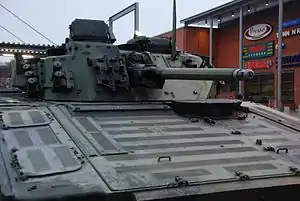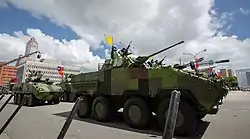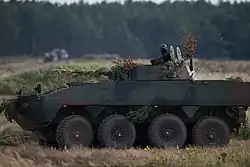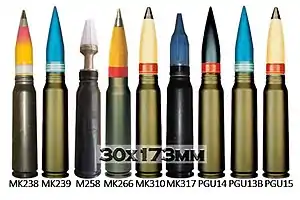Mk44 Bushmaster II
The Mk44 Bushmaster II is a 30 mm chain gun manufactured by Northrop Grumman. It is a derivative of the 25 mm M242 Bushmaster, and uses 70% of the same parts as the M242 while increasing the firepower by as much as 50% with the 20% increase in caliber size. The barrel is chromium-plated for extended life. The gun uses standard GAU-8 Avenger ammunition that is available in API (Armor-Piercing Incendiary), HEI (High-Explosive Incendiary) and APFSDS-T (Armor-Piercing Fin-Stabilized Discarding Sabot-Tracer) variants. The gun can be converted to a caliber of 40x180 mm, which involves changing the barrel and a few key parts, to use the SuperShot 40 cartridge. It can also be converted to use the 30x170 mm RARDEN cartridge.
| Mk44 Bushmaster II | |
|---|---|
 Finnish CV 9030 with Mk44 | |
| Type | Chain gun autocannon |
| Place of origin | United States |
| Service history | |
| In service | 2007–present |
| Used by | See users |
| Production history | |
| Designer | Alliant Techsystems |
| Manufacturer | Northrop Grumman |
| Specifications | |
| Mass | 344 lb (160 kg) |
| Length | 134.05 inches (3,405 mm) |
| Barrel length | 94.88 inches (2,410 mm) |
| Width | 13.5 inches (340 mm) |
| Height | 15.43 inches (392 mm) |
| Shell | 30×173mm 40×180mm |
| Caliber | 30 millimetres (1.18 in) caliber 40 millimetres (1.57 in) caliber |
| Rate of fire | 100/200 rounds per minute |
| Muzzle velocity | 1,080 metres per second (3,500 ft/s) (HEI-T ammunition) |
| Effective firing range | 3,000 metres (9,800 ft) land appl. 5,100 metres (16,700 ft) naval appl. |
History
The Bushmaster II is the standard primary armament of the Bionix-II AFV currently in service with the Singapore Army, the KTO Rosomak in Polish service, and the CV90 AFVs in Finnish, Norwegian and Swiss service. Although the United States Air Force selected this cannon to replace the 25 mm GAU-12 Equalizer and Bofors 40 mm Automatic Gun L/60 guns on its fleet of AC-130U gunships in 2007, this plan was later canceled.[1] The United States Marine Corps' cancelled Expeditionary Fighting Vehicle, was expected to be armed with this cannon as well. Some United States Navy vessels, such as the new San Antonio-class amphibious transport dock are armed with the Bushmaster II for surface threat defense.
The Bushmaster II cannon is used in the DS30M Mark 2 Automated Small Calibre Gun (ASCG) point defense system that is fitted to the Royal Navy's Type 23 frigates.[2]
The Bushmaster II cannon is also used in the Turkish made Aselsan SMASH stabilized weapon station.[3]
The USAF had experimented with installing Bushmaster II cannons on their AC-130U gunships in place of the GAU-12 and Bofors 40 mm cannons. On 11 August 2008, the effort was canceled because of problems with the Bushmaster's accuracy in tests "at the altitude we were employing it." There were also schedule considerations that drove the decision.[4] On 9 July 2012, the Air Force type classified a new version of the Bushmaster called the GAU-23/A. The cannon will be used on the AC-130W and the AC-130J gunships.[5]
_fires_a_MK-46_30mm_gun_during_a_live-fire_exercise_(28540439144).jpg.webp)
The U.S. Navy uses the Mk44 Bushmaster II in the Mk 46 Mod 2 Gun Weapon System (GWS). The GWS is produced by General Dynamics to give warships protection against small, high-speed surface craft. A Mk 46 turret consists of the 30 mm chain gun, a forward looking infrared (FLIR) sensor, a low light television camera, and a laser rangefinder. The guns fire at 200 rounds per minute and are fed by a 400-round magazine through 200-round dual feeds. Effective range is 2,200 yd (2,000 m) for full-caliber high-explosive or armor-piercing ammunition, which can be extended when using sub-caliber rounds. The Mk 46 GWS is permanently installed on the San Antonio-class amphibious transport dock and can be installed on Freedom and Independence-class littoral combat ships as part of the surface warfare (SuW) package.[6][7] In 2012, the Navy decided to replace the Mk 110 57 mm cannons on Zumwalt-class destroyers with the Mk 46 GWS.[8]
Orbital ATK developed a modified version of the Bushmaster II, known as the Mk44 STRETCH, which can fire the 30x173mm Mk310 PABM-T airburst round.[9][10]
In January 2020, Northrop Grumman revealed the development of proximity airburst rounds for the LCS' 30 mm gun modules to destroy small unmanned aerial vehicles (UAVs). Since the modules feature dual feeders, different types of rounds could be fed for different targets.[11]
XM813
The XM813 Bushmaster is based on the Mk44 and is offered as an upgrade for U.S. Army M1126 Stryker and M2 Bradley vehicles, as well as having been a contender to be the primary armament of the Ground Combat Vehicle. Improvements include a 2.54 cm (1 inch) longer barrel, integral mount to increase first round hit probability by up to 10%, a dual recoil system to enhance accuracy and cope with future hotter propellants, and a Meggitt linkless dual feed ammunition system.[12] The 30 mm chain gun can fire Mk310 Programmable Air Burst Munition rounds to attack targets in defilade. The United States Army Research, Development and Engineering Command helped enhance the XM813 mainly for safety and turret integration. By changing five parts, the gun caliber can be increased to 40 mm. As of November 2013, the XM813 was being tested at Aberdeen Proving Ground over three months to ensure reliability levels of 40,000 mean rounds between failures. Long-term plans are to equip vehicles with the Bushmaster III 35mm/50mm cannon.[13][14]
The XM813 was demonstrated in September 2014 at the ARDEC Digital Multi-Purpose Range Complex. The gun was mounted on a Bradley Fighting Vehicle and fired at targets up to 1,500 metres (0.93 mi) away. An enhanced fire control system improves long-range accuracy to kill targets with fewer bursts, sometimes as few as two or three rounds instead of 10. The XM813 30 mm cannon is intended to replace the M242 Bushmaster 25 mm chain gun, and can be mounted on vehicles other than the Bradley. Two capabilities not demonstrated were its linkless ammunition with airburst capabilities; airburst rounds increase lethality by enabling engagement of targets in defilade when they would otherwise only be suppressed by fire.[15]
In early 2015, the U.S. Army approved an upgrade for 81 Stryker vehicles of a Stryker Brigade Combat Team deployed in Europe to be upgunned with the Mk44 30 mm Bushmaster cannon to increase their lethality against other light armored vehicles used by Russia in the theater.[16] The cannons will be installed by 2018, and may be the first step in adding the Bushmaster to the entire active fleet of about 1,000 Strykers;[17] the XM813 variant will be used with the Strykers.[18] The XM813 has a demonstrated firing ability out to 3,000 metres (1.9 mi) for precision firing, nearly twice as far as the M2 .50 caliber machine gun that has a maximum effective range of 1,830 metres (1.14 mi) as an area suppression weapon. The first upgunned Stryker, known as the "Dragoon" for the 2nd Cavalry Regiment the vehicles will be part of, was delivered in October 2016,[19][20] and the first Infantry Carrier Vehicle - Dragoon (ICVD) was delivered to the 2CR in Germany in December 2017.[21]
The ATK MK44-ABM variant of the Bushmaster was selected in 2018 by the Spanish Army to equip the Tizona turret of the Line version (IFV) of the Dragón IFV, the replacement of the Pegaso BMR.[22]
Users
.JPG.webp)

_(2).jpg.webp)


 Argentina
Argentina
- Navy: Gowind-class design
 Brazil
Brazil
- Army: VBTP-MR Guarani[23]
- Navy: Amazonas-class corvette
 Czech Republic
Czech Republic
- Army: Pandur II CZ
 Finland
Finland
- Army: CV9030FIN
 Indonesia
Indonesia
- Army: Pindad Cobra IFV[24]
- Navy: Mamuju-class, Pari-class patrol vessel, Pollux-class research vessel and Clurit-class fast attack craft
- Coast Guard: Tanjung Datu-class and Pulau Nipah-class offshore patrol vessel
 Ireland
Ireland
- Army: Mowag Piranha
 Japan
Japan
- Coast Guard: Hateruma-class patrol vessels, Kunigami-class patrol vessels (later ships), & Iwami-class patrol vessels
 Lithuania
Lithuania
 Netherlands
Netherlands
 Norway
Norway
- Army: CV9030N
 Philippines
Philippines
 Poland
Poland
 Portugal
Portugal
- Army: Pandur II
 Romania
Romania
- Army: Mowag Piranha V
 Singapore
Singapore
- Army: Bionix II, Hunter AFV
 Spain
Spain
- Army: Dragón IFV
.svg.png.webp) Switzerland
Switzerland
- Army: CV9030CH
 Taiwan
Taiwan
- Army: CM-34 (IFV variant)
 Thailand
Thailand
- Navy: Tachin-class frigate, Naresuan-class frigate, Krabi-class offshore patrol vessel, Leamsing-class patrol craft (gun), T.991-class coastal patrol craft, T.994-class coastal patrol craft, Angthong-class amphibious transport dock and Ladya-class mine countermeasure vessel
 United Kingdom
United Kingdom
- Navy: Type 23 frigate, Type 45 destroyer
 United States
United States
- Army: XM1296 Stryker Dragoon
- Navy: San Antonio-class transport ship, Littoral combat ship and Zumwalt-class destroyer
- Air Force: AC-130W, AC-130J (GAU-23/A)
- Coast Guard: Polar Security Cutter[27]
Munitions

| name | short description | notes |
|---|---|---|
| MK238 | High Explosive Incendiary-Tracer (HEI-T) | This round self-destructs if it misses its target.[28] |
| MK239 | Target Practice Traced (TP-T) | training ammunition, ballistically matched with the MK264.[29] |
| MK258 | Armor Piercing, Fin Stabilized, Discarding Sabot-Tracer (APFSDS-T) | The round is designed to be "supercavitating" to increase its effectiveness when fired at targets like underwater mines.[30] |
| MK264 | Multi Purpose Low Drag-Tracer(MPLD-T) | Light armor-piercing capability with a delayed explosive reaction using a chemical fuze. It is available with and without Self Destruct (SD). |
| MK266 | High Explosive Incendiary-Tracer (HEI-T) | An update to an earlier round, with enhanced range.[31] |
| MK310 | Programmable Air Burst Munition-Tracer (PABM-T) | Can be programmed to explode in the air above target to wound or kill enemies behind cover.[32] |
| MK317 | Target Practice Discarding Sabot-Tracer (TPDS-T) | A training round.[33] |
| PGU14/B | Armor Piercing Incendiary (API) | A relatively lightweight projectile with a core of dense depleted uranium penetrator.[34] |
| PGU13D/B | High Explosive Incendiary (HEI) | Aircraft mounted cannons use the round against personnel, trucks, ammunition storage, and other targets.[35] |
| PGU15A/B | Target Practice (TP) | A training round with the same ballistic properties of PGU13D/B.[36] |
See also
- Bushmaster 25 mm chain gun
- Bushmaster III 35/50 mm chain gun
- Bushmaster IV 40 mm chain gun
- 30mm Shipunov 2A42—Soviet/Russian autocannon
- 30mm L21A1 RARDEN—British autocannon
- Future Combat Systems Infantry Carrier Vehicle
References
- Notes
- "AIR FORCE CANCELS 30 MM CANNON PROGRAM FOR AC-130U GUNSHIPS - Inside the Air Force, 11 July 2008". Archived from the original on 28 September 2011.
- "Scott, Richard, ASCG enhances Type 23 close-in defence, International Defence Review, 30 October 2007". Archived from the original on 4 July 2009. Retrieved 14 June 2009.
- "30 mm SMASH Remote Controlled Stabilized Naval Gun System". Aselsan. Retrieved 7 December 2020.
- "Spooky Gun Swap Canceled" Archived 11 October 2008 at the Wayback Machine. Air Force Magazine, October 2008, Volume 91, Number 10, p. 24.
- GAU-23 30mm Automatic Cannon Receives Type Classification Archived 11 December 2012 at the Wayback Machine - Prnewswire.com, 9 July 2012
- Mk-46 GWS Archived 2 November 2014 at the Wayback Machine - Seaforces.org
- Navy Orders Six More General Dynamics Littoral Combat Ship MK46 Mod 2 Gun Weapon Systems Archived 2 November 2014 at the Wayback Machine - Guns.com, 21 March 2013
- Navy Swaps Out Anti-Swarm Boat Guns on DDG-1000s Archived 31 October 2014 at the Wayback Machine - News.USNI.org, 5 August 2014
- "Orbital ATK: Placing its Programmes on Target". Mönch Publishing Group. Archived from the original on 11 August 2018. Retrieved 11 August 2018.
- "30mm & 20mm x 173mm Munition System". www.orbitalatk.com. Archived from the original on 2 July 2017. Retrieved 19 April 2018.
- Navy LCS Gun Could Get Potent Airburst Rounds to Take Out Drones. Military.com. 16 January 2020.
- "Orbital ATK rolls out XM813 automatic cannon for US Army Strykers". Jane's 360. Archived from the original on 11 August 2018. Retrieved 11 August 2018.
- "Archived copy" (PDF). Archived from the original (PDF) on 19 July 2013. Retrieved 8 December 2013.
{{cite web}}: CS1 maint: archived copy as title (link) - Bigger, badder Bushmaster cannon in the works - Armytimes.com, 8 November 2013
- 30-mm weapon system on display Archived 17 October 2014 at the Wayback Machine - Army.mil, 16 September 2014
- US Army: Strykers Need Bigger Gun to Fight Russia - Defensenews.com, 24 July 2015
- Firepower Upgrade Planned for GDLS Strykers - Defensenews.com, 14 October 2015
- US Army Seeks New Stryker Capability Beyond Bigger Gun Archived 20 December 2016 at the Wayback Machine - Militarytimes.com, 1 March 2016
- Army UpGuns Stryker Infantry With 30mm Cannon to Counter Russia in Europe Archived 30 October 2016 at the Wayback Machine - Scout.com/Military, 5 October 2016
- Army's New Up-Gunned Stryker Shoots Farther, Hits Harder Archived 5 November 2016 at the Wayback Machine - Military.com, 31 October 2016
- 2CR Receives the First 30mm Stryker in Europe Archived 22 March 2018 at the Wayback Machine. Defense Visual Information Distribution Service. 8 December 2017.
- "Navantia y Elbit montarán este julio la primera torre Tizona en San Fernando". 11 July 2019. Infodefensa.com 11 July 2019
- "Blindado Guarani recebe torre dotada de canhão - Forças Terrestres - ForTe". forte.jor.br. 1 July 2011. Archived from the original on 26 April 2018. Retrieved 19 April 2018.
- "Indonesian army to receive Pandur II Cobra IFVs". www.armyrecognition.com. Retrieved 29 October 2019.
- Tomkins, Richard (16 March 2017). "Lithuania orders Bushmaster guns from Orbital ATK". United Press International. Archived from the original on 17 March 2017. Retrieved 17 March 2017.
- Foss, Christopher F (17 March 2017). "Lithuanian Boxers to be armed with 30 mm MK44 cannons". IHS Jane's 360. London. Archived from the original on 17 March 2017. Retrieved 17 March 2017.
- Ong, Peter (21 April 2022). "USGC's Polar Security Cutters to Receive Mark 38 Mod 4 Guns". Naval News. Retrieved 24 April 2022.
-
"30x173mm ammunition suite: MK264 MPLD-T - MK239 TP-T - MK238 HEI-T/SD - MK258 APFSDS-T - 30mm HEAB-T - MK317 TPDS-T" (PDF). General Dynamics. Retrieved 22 October 2020.
High Explosive Incendiary Tracer with Self Destruct, MK238: Low cost proven HEI-T with reliable M758 point detonating fuze with self destruct
- "30x173MM ammunition suite for Mk44 cannon" (PDF). General Dynamics. Retrieved 22 October 2020.
-
"Mk 258 Armor Piercing, Fin Stabilized, Discarding Sabot-Tracer (APFSDS-T) Anti-Mine Projectile Hydroballistic Ammo 30mm Ammunition". Global Security. Retrieved 22 October 2020.
The lethality of the round gives a simple look, shoot, kill capability to the helicopter crew enabling them to maintain a rapid tempo of operations and maximizing the tactical effectiveness of every mission while minimizing exposure to hostile forces.
-
"ATK receives U.S. Navy ammo order". United Press International. Arlington, Virginia. 8 March 2013. Retrieved 22 October 2020.
ATK's MK266, a modification to the PGU-13 High Explosive Incendiary 30mm round, features a tracer and non-self-destruct, low-drag fuse for enhanced performance at extended ranges.
-
Don Gloude (1 September 2011). "25 x 59mm LW25 Programmable Air Burst Munition" (PDF). 2011 NDIA Gun & Missile Systems Conference. Retrieved 22 October 2020.
Inductive programming that is common with ATK's 30mm PABM-T Mk310; reliable and simple to integrate.
-
Scott R. Gourley (18 August 2013). "Army Refines 30mm Ammunition Efforts for GCV". Defense Media Network. Retrieved 22 October 2020.
Target Practice Discarding Sabot-Tracer (TPDS-T) Mk. 317 [a quantity of 2,000 rounds will be required to be submitted].
-
John Pike (9 January 1999). "PGU-14/B API Armor Piercing Incendiary [DU] 30mm Ammunition". Federation of American Scientists. Retrieved 22 October 2020.
The PGU-14/B API Armor Piercing Incendiary round has a lightweight body which contains a sub-calibre high density penetrator of Depleted Uranium (DU).
-
"30mm x 173 GAU-8/A Ammunition: PGU-13/B HEI – PGU-14/B API – PGU-15/B TP". General Dynamics. Retrieved 22 October 2020.
High Explosive Incendiary (HEI): Provides fragmentation and incendiary effects for use against personnel, trucks, ammunition storage, and many other targets.
-
John Pike (9 January 1999). "PGU-15/B TP Target Practice 30mm Ammunition". Federation of American Scientists. Retrieved 22 October 2020.
The PGU-15/B TP Target Practice projectile simulates the exterior ballistics and provides a ballistic match to the HEI round and is used for pilot training.